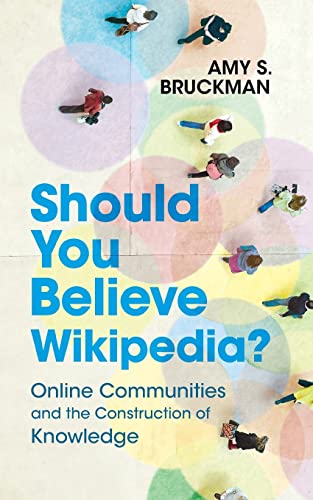

Should You Believe Wikipedia?
S**K
Online Communities are Communities
Our interactions online are a source of connection for many of us and are an extension of our physical interactions. In Should You Believe, Amy Bruckman explores both the benefits and the challenges of online communities. The internet can be both important sources of knowledge and connection, while also sometimes being a source of misinformation, disinformation, and worse. The central idea in the book is that that online communities are communities, and the principles make for good physical communities also to online ones.The book has a slightly academic style, but I found it engaging. It’s worth a read if you want to think a bit more deeply about why some online groups work better than others, especially if you are a moderator of an online group. “Can You Trust Wikipedia” provides the background to help you put the challenges and benefits of online discourse in context.
S**N
A foundational read for democratized learning content
This book nails the full scope of opportunities and challenges with democratized learning content—from the logistics of accuracy and reputation to the impact of platform business models and value exchange on creator behaviors. She pulls in references and examples from a variety of thinkers in this space, providing a strong foundational framework to draw from. As someone working on a contributor model for a technical learning platform, I found this book extremely relevant and comprehensive—a great reference to help others understand the complexities involved and potential paths forward. Highly recommend!
M**.
Examines Online Communities, not just Wikipedia
I'm a very biased reviewer since I took Amy Bruckman's graduate class on Design of Online Communities at Georgia Tech and she uses much of the core reading material as well as content from student projects over the years in the book. The title is provocative and is covered in one chapter so the rest of the book looks at online communities more broadly rather than just looking at Wikipedia. Overall I would say the book really capsulizes Bruckman's teaching and research career and is the book she probably wished she had for her class. A recommended read for anyone interested in the field of human-computer interaction and social informatics to give you a deeper understanding of online communities.
J**O
Good book
We read this in class, it had interesting thoughts especially around modern conceptions of epistemology and how we fashion online systems around knowledge sharing and community building.
S**N
Clear Writing on Online Communities
Bruckman understands the dynamics of online communities and the challenges for managing bad online behavior. I was impressed by the book's clear writing. When she introduces another expert in the field, she provides a helpful introduction to that person's research and resists using academic jargon.My favorite chapter is the one that lends the book it's name, "Should You Believe Wikipedia?" Bruckman helps the reader through a logical progression even as she engages with some thorny epistemological concepts. How do we know what we know? Why might (or might not we) be comfortable trusting a crowdsourced internet encyclopedia? How do we evaluate the strength of sources that are used to support the information on Wikipedia?Bruckman's book ends with the importance of the "Virtue Ethics" framework. Software (code) embodies human values, and how that framework can help us on the continuing journey to improve from an ethical standpoint.
M**R
Essential reading for anyone designing and building online communities responsibly
I discovered this book through a CBC spark podcast episode. It was very timely as I'm a UX/product designer working on a project building an online community.I was especially interested in how online communities form social norms, and which conditions are conducive to great discussion across dives of political affiliation, beliefs and points-of-view.The book was an excellent balance of relatable and joy to read, while having enough depth and rigour to be truly valuable to my work.The later chapters on how business models shape the character of online communities has never been more relevant.I'd recommend this book for anyone curious and passionate about what's happening in the world today, and how the the platforms where we talk about what's happening have tremendous material impact (both negative and positive).
L**J
Thoughtful, breezy analysis of Wikipedia
This book was recommended to me by my dissertation supervisor as I am working on a dissertation about Wikipedia. I sat down and read it in one sitting-- it was very compelling!I was impressed by the breadth of perspectives in this book, and particularly enjoyed the chapter about epistemology and the construction of knowledge in community and virtual spaces. (This is my research area, so I guess I am biased, but it was very well done.) It is not too dense for the casual reader but also offered some very interesting insights which I intend to explore in my research.I definitely recommend this book!
S**S
A must read to understand how online communities works
Full of examples and references to understand the power and mechanisms of online communities.
Trustpilot
1 day ago
4 days ago